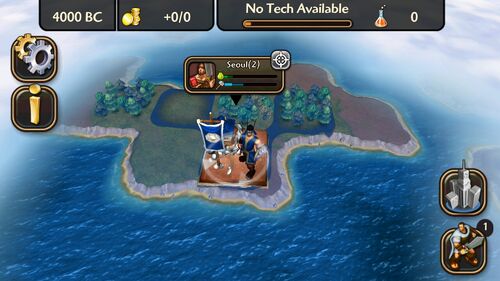A civilization in Civilization Revolution 2 | |
| Era Bonuses | |
|---|---|
| Leaders | |
| Begin the game with | Alphabet |
![]() Back to the list of civilizations
Back to the list of civilizations
The Korean people represent a civilization in Civilization Revolution 2. Their color is dark blue.

History[]
The Korean peninsula, is comprised of the divided republics of North and South Korea. At times rivaling its powerful neighboring states of China and Japan, Korea has been home to numerous kingdoms over the ages.
The Choson Dynasty, widely regarded as the most notable kingdom in Korea's history, due to its 500-year rule, was founded by the rebellious Commander Yi Song-gye in 1392. Yi seized control of Korea, dethroning the reigning king in a military coup. Forming his own dynasty and renaming himself King Taejo of Choson, named for the ancient Choson kingdom, Taejo would create the first unified Korean dynasty in the region's history.
The most revered of the Choson leaders, King Sejong the Great, ruled from 1418 until his death in 1450. Sejong's policies allowed for vast advances in the arts and sciences, including the publication of the Korean written language, "Hangul". It was also during this period that Korean Confucianism, its roots established during the preceding dynasty, would take hold over Korea, becoming the primary school of thought for scholars across the peninsula. These Confucian values, emphasizing morality and self-improvement, became the basis for many of the values held sacred by Korean society today.
Over the course of the 500 year Choson Dynasty, 27 distinct monarchs would rule, finally ending in 1897. During the waning years of the dynasty, Korea underwent a period of isolationism, limiting contact with the surrounding nations in an effort to blunt outside influence. Having long been the subject of Chinese and Japanese influence, many historians believe that it was during this period, that the first hints of the modern Korean national identity began to take shape.
Today, the region is split into the democratic South Korea and the socialist North Korea. As one of the four "Asian Tigers", South Korea experienced rapid economic development between the 1960s and 1990s due to export oriented policies that spurred development and is currently home to some of the largest multinational companies such as Samsung and LG. Conversely, the government of North Korea has maintained a level of isolation, rejecting the policies that lead to its southern counterpart's economic success.
Fun Facts[]
South Korea is famous for its gaming culture, particularly competitive gaming. Professional matches and tournaments receive widespread media attention throughout the country, including broadcasts on several television networks.
Korea became known as "The Land of the Morning Calm" because the Chinese characters for Choson were often translated into English as "Morning Calm".
Kimchi is possibly the most widely recognized dish native to Korea. Though hundreds of varieties of Kimchi exists, it is typically made from fermented cabbage, radish scallions or cucumbers and usually accompanies every meal in Korean cuisine.
The national sport of South Korea, Tae Kwon Do, developed after the end of the Japanese occupation of Korea. The sport is believed to be a decedent of the traditional Korean martial art known as "Taekkyeon".
The Juche Tower is a monument in Pyongyang, North Korea. Named after the ideology of introduced by its first leader Kim Il-Sung, Juche is a blend of nationalism, traditionalism, Marxism-Leninism, autarky and self-reliance. The structure stands 560 ft. tall and contains 25,550 granite blocks, one for each day of Kim Il-Sung's life.
